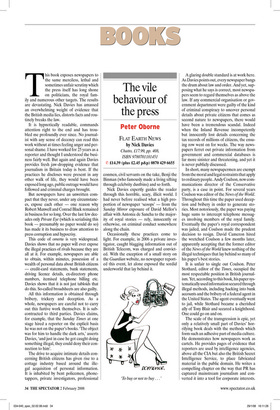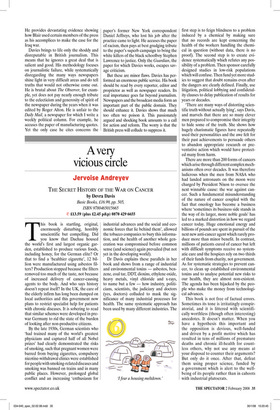The vile behaviour of the press
Peter Oborne
FLAT EARTH NEws by Nick Davies Chatto, £17.99, pp. 408, ISBN 9780701181451 ✆ £14.39 (plus £2.45 p&p) 0870 429 6655 This book exposes newspapers to the same merciless, lethal and sometimes unfair scrutiny which the press itself has long shone on politicians, the royal family and numerous other targets. The results are devastating. Nick Davies has amassed an overwhelming weight of evidence that the British media lies, distorts facts and routinely breaks the law.
It is hypnotically readable, commands attention right to the end and has troubled me profoundly ever since. No journalist with any sense of decency can read this work without at times feeling anger and personal shame. I have worked for 25 years as a reporter and thought I understood the business fairly well. But again and again Davies provides fresh jaw-dropping evidence that journalism in Britain today is bent. If the practices he discloses were present in any other walk of life, they would have been exposed long ago, public outrage would have followed and criminal charges brought.
But newspapers have an unwritten compact that they never, under any circumstances, expose each other — one reason why Robert Maxwell and Conrad Black remained in business for so long. Over the last few decades only Private Eye (which is serialising this book — presumably no paper would do so) has made it its business to draw attention to press corruption and hypocrisy.
This code of omerta is very widespread. Davies shows that no paper will ever expose the illegal practices of rivals because they are all at it. For example, newspapers are able to obtain, within minutes, possession of a wealth of personal data about British citizens — credit-card statements, bank statements, driving licence details, ex-directory phone numbers, itemised telephone billing etc. Davies shows that it is not just tabloids that do this. So-called broadsheets are also guilty.
All this information is obtained through bribery, trickery and deception. As a whole, newspapers are careful not to carry out this furtive work themselves. It is subcontracted to third parties. Davies claims, for example, that the Sunday Times at one stage hired a reporter on the explicit basis he was not on the paper’s books. ‘The object was for him to handle the dark arts,’ asserts Davies, ‘and just in case he got caught doing something illegal, they could deny their connection to him’.
The drive to acquire intimate details concerning British citizens has given rise to a cottage industry based around the illegal acquisition of personal information. It is inhabited by bent policemen, phonetappers, private investigators, professional conmen, civil servants on the take, Benji the Binman (who famously made a living sifting through celebrity dustbins) and so forth.
Nick Davies expertly guides the reader through this horrible, scary, illicit world. I had never before realised what a high proportion of newspaper ‘scoops’ — from the Sunday Mirror exposure of David Mellor’s affair with Antonia de Sancha to the majority of royal stories — rely, innocently or otherwise, on criminal conduct somewhere along the chain.
Occasionally these practices come to light. For example, in 2006 a private investigator, caught blagging information out of British Telecom, was charged and convicted. With the exception of a small story on the Guardian website, no newspaper reported this event, let alone exposed the sordid underworld that lay behind it. A glaring double standard is at work here. As Davies points out, every newspaper bangs the drum about law and order. And yet, supposing what he says is correct, most newspapers seem to regard themselves as above the law. If any commercial organisation or government department were guilty of the kind of criminal conspiracy to uncover personal details about private citizens that comes as second nature to newspapers, there would have been a tremendous scandal. Indeed when the Inland Revenue incompetently but innocently lost details concerning the tax records of millions of citizens, the ensuing row went on for weeks. The way newspapers ferret out private information from government and commercial databases is far more sinister and threatening, and yet it is never publicly discussed.
In short, many newspapermen are exempt from the moral and legal restraints that apply to ordinary people. Andy Coulson, now communications director of the Conservative party, is a case in point. For several years Coulson was editor of the News of the World. Throughout this time the paper used deception and bribery in order to generate stories. Most notoriously, the paper was paying huge sums to intercept telephone messages involving members of the royal family. Eventually the paper’s royal correspondent was jailed, and Coulson made the prudent decision to resign. David Cameron hired the wretched Coulson a few months later, apparently accepting that the former editor of the News of the World knew nothing of the illegal techniques that lay behind so many of his paper’s best stories.
It is unfair to single out Coulson. Peter Stothard, editor of the Times, occupied the most respectable position in British journalism. Yet, according to this book, his paper systematically used information secured through illegal methods, including hacking into bank accounts and the bribery of a federal agent in the United States. The agent eventually went to jail, while Stothard became a cherished ally of Tony Blair and secured a knighthood. One could go on and on.
The scale of the transgression is epic, yet only a relatively small part of Davies’ horrifying book deals with the methods which form such an adhesive part of media culture. He demonstrates how newspapers work as cartels. He provides pages of evidence that reporters are used by intelligence agencies, above all the CIA but also the British Secret Intelligence Service, to place fabricated material in the public domain. He writes a compelling chapter on the way that PR has captured mainstream journalism and converted it into a tool for corporate interests. He provides devastating evidence showing how Blair used certain members of the press as his accomplices to make the case for the Iraq war.
Davies brings to life only the shoddy and disreputable in British journalism. This means that he ignores a great deal that is salient and good. His methodology focuses on journalistic failure, while systematically disregarding the many ways newspapers shine light in very difficult areas and do tell truths that would not otherwise come out. He is brutal about The Observer, for example, yet does not pay nearly enough tribute to the eclecticism and generosity of spirit of the newspaper during the years when it was edited by Roger Alton. He is unfair to the Daily Mail, a newspaper for which I write a weekly political column. For example, he accuses the paper of manufacturing quotes. Yet the only case he cites concerns the paper’s former New York correspondent Daniel Jeffreys, who lost his job after the practice came to light. He accuses the paper of racism, then pays at best grudging tribute to the paper’s superb campaign to bring the white killers of the black schoolboy Stephen Lawrence to justice. Only the Guardian, the paper for which Davies works, escapes savage criticism.
But these are minor flaws. Davies has performed an enormous public service. His book should be read by every reporter, editor and proprietor as well as newspaper readers. Its real importance goes far beyond journalism. Newspapers and the broadcast media form an important part of the public domain. They should enhance it. Davies shows that much too often we poison it. This passionately argued and shocking book amounts to a call for action and reform. The worry is that the British press will collude to suppress it.



































































 Previous page
Previous page